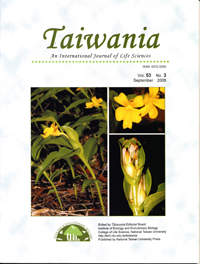Research Paper
Endemics and Pseudo-Endemics in Relation to the Distribution Patterns of Indian Pteridophytes
C. R. Fraser-Jenkins
Published on: September 2008
Page: 264 - 292
DOI: 10.6165/tai.2008.53(3).264
Abstract
Of c. 530 Pteridophytes reported as endemic to the India in recent decades (about half the total number of c. 950-1000 known Indian species), the great bulk are mistaken, particularly those from the Indo-Himalaya. Only 47 endemic Indian ferns, less than 10% of those reported previously, are accepted here. But this figure includes several that are rather doubtfully endemic, mainly due to unresolved taxonomic doubt, or because they may be expected to occur in adjacent Countries. Thus 8 are taxonomically dubious, requiring further study, and a further 7, all from N.E. India, may possibly be expected elsewhere outside India. The c. 483 mistaken pseudo-endemics arose mainly due to naming of erroneous 'new species' thought to be endemic, or due to not knowing the range of species outside political India, combined with insufficient investigative taxonomic research. In the present paper previous reports of endemics are listed and their status is reappraised along with a new list of accepted endemics. Quite opposite to previous conclusions, the great majority of endemic Indian Pteridophytes are peninsular-Indian to south-Indian ferns (27, plus 5 more taxonomically dubious), with far fewer being N.E. Indian (7, all of which may possibly be expected elsewhere outside India) and W. Himalayan (2, plus 1 taxonomically dubious); the floristically Malesian Nicobar Islands have (3, plus 2 more taxonomically dubious). These numbers are only to be expected as N.E. India is an intimate part of the Sino-Himalayan and S.E. Asian flora, connected without barriers to Tibet and China or to Myanmar by two mountain chains, while S. India is more isolated geographically since more ancient times and has a partly Malesian fern-flora. Some details of Indian endemics in relation to phytogeographical elements are given. Endemic species: Huperzia - 1, Selaginella - 9, Isoetes - 1, Osmunda - 1, Arthromeris - 1, Phymatosorus - 1, Oreogrammitis - 2, Trichomanes - 1, Pteris - 1, Cyathea - 3, Lindsaea - 3, Asplenium - 3, Thelypteris - 3, Athyrium - 2, Tectaria - 1, Dryopsis - 1, Dryopteris - 3, Polystichum - 4, Bolbitis - 3, Elaphoglossum - 3.
中文摘要
近幾十年來,約有530 種蕨類植物被發表為印度特有種(約占已知印度蕨類總數950-1000 種的一半),特別是源自於印度-喜馬拉雅地區的種類,有極大的數量是錯誤的。本研究確認的印度特有種數量僅為47 種,低於前人發表數量的10%。但這個數目仍包含數個不確定的特有種:主要肇因於部份種類仍有分類上的疑異尚未解決,或是可能出現在其他鄰近國家。例如,其中有8 種為具分類爭議的種類,需要更進一步的研究;有7 種分布於印度東北方的種類可能出現在印度境外的其他地區。由於當初被認定為地區性特有的新種而錯誤命名,或是缺乏這些種類在印度境外的分布範圍,以及不充分的分類研究,導致了約483 種印度假特有種的誤謬。本研究逐一重新評估過去被認為的特有種,並提列在此承認的印度特有種新名單。與前人的結論截然相反:印度特有的蕨類植物主要分布於印度半島至南印度(27 種,以及具有分類爭議的5 種),少數特有種分布於印度東北方(7 種,全都可能分布於印度境外)、喜馬拉雅西部(2 種,以及1 種具分類爭議)、馬來西亞植物區系的尼科巴群島(3 種,以及具分類爭議的2 種)。根據這些數據僅可以推論兩座山脈不能阻絕印度東北部與西藏、中國,或緬甸植物相的連結,這個地區是與中國-喜馬拉雅以及東南亞植物相緊密相連的一部分。相對來說印度南方自古以來便是一個較為獨立的地理區塊,並具備部分的馬來西亞蕨類植物相。本研究亦提供印度特有種與植物地理區系元素關聯的一些細節。印度特有種:石杉屬1 種,卷柏屬9 種,水韭屬1 種,紫萁屬1 種,肢節蕨屬1 種,擬茀蕨屬1 種,山禾葉蕨屬(Oreogrammitis)2 種,假脈蕨屬1 種,鳳尾蕨屬1 種,桫欏屬3 種,鱗始蕨屬3 種,鐵角蕨屬3 種,金星蕨屬3 種,蹄蓋蕨屬2 種,三叉蕨屬1種,擬鱗毛蕨屬1 種,鱗毛蕨屬1 種,耳蕨屬4 種,實蕨屬3 種,舌蕨屬3 種。
Keyword: India, Pteridophytes, endemics, phytogeography, pseudo-endemics. 印度、蕨類植物、特有種、植物地理學、假特有種。


